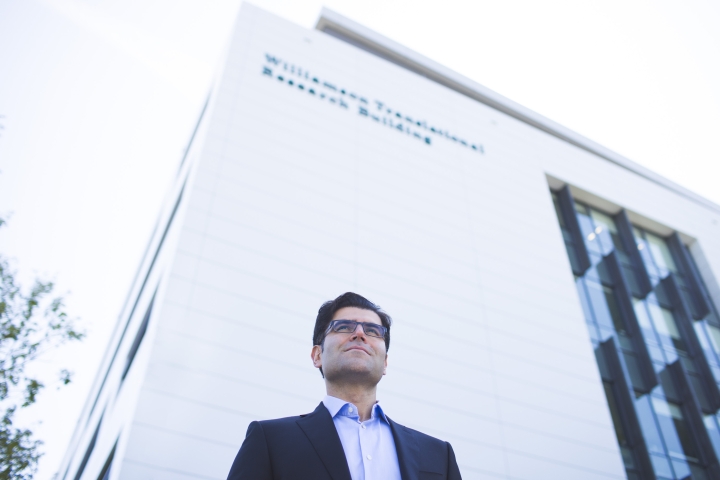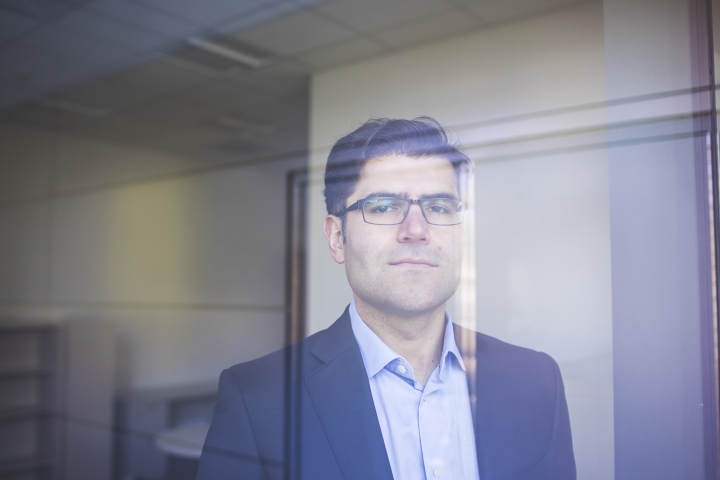Dartmouth has created a Center for Precision Health and Artificial Intelligence to spur interdisciplinary research that can better leverage—as well as more safely and ethically deploy—biomedical data in assessing and treating patients and improving their health care outcomes.
The center is being launched with initial funding of $2 million from the Geisel School of Medicine and Dartmouth Cancer Center and is based in the Williamson Translational Research Building, a Dartmouth-owned building on the Dartmouth Hitchcock Medical Center campus in Lebanon, N.H.
“Artificial intelligence is poised to play a transformative role in health care by delivering rapid and innovative solutions to real-world clinical challenges, improving patient outcomes, and creating better and more equitable access for all,” says President Philip J. Hanlon ’77.
“This new center will help foster innovation and collaboration in these critically important fields.”
Precision health is a holistic approach that aims to personalize health care by tailoring treatments and disease prevention strategies to a person’s unique biology—their genes, medical history, lifestyle, and environment.
A wealth of biomedical data can be gathered through genomic sequencing, molecular testing, imaging techniques, and wearable monitoring devices, all of which have become more advanced, affordable, and broadly available over the past decade.
AI holds the key to extracting valuable insight from this deluge of data because it can sift through and analyze complex and heterogeneous information to identify trends and patterns and extract digital biomarkers that can guide clinically actionable decisions.
Machine learning models trained on a host of different data sets can predict disease risk, enhance the accuracy of diagnoses, anticipate the course of an illness, and tailor treatment options best suited to the patient.
CPHAI will be governed by the dean of Geisel and advised by a committee that will have representatives and stakeholders from Geisel, Dartmouth Cancer Center, Thayer School of Engineering, Arts and Sciences, and Dartmouth Health.
“It is truly a Dartmouth center with leaders and advisers from across the institution connecting clinicians and AI scientists,” says Geisel Dean Duane Compton.
By harnessing the power of AI and machine learning, CPHAI aims to create a toolbox of digital technologies that will empower providers to identify and deliver the most effective health care strategy for each patient.
Researchers will work on projects such as developing AI-driven diagnostic tools, optimizing treatment strategies, and analyzing biomedical data to inform public health policies.
AI models created through collaborations with radiologists and pathologists will be able to draw precise and complex inferences directly from medical images that complement the knowledge and experience of human imaging professionals and make diagnoses more reliable and efficient, reducing potential diagnostic errors.
The center will also enable researchers to evaluate new digital tools they develop in clinical settings, paving the way for creating and building applications that can be integrated into health care systems after seeking FDA approval.
“What makes CPHAI unique is its interdisciplinary and comprehensive approach to precision health and artificial intelligence, focusing not only on technological advancements but also on ethical and societal implications,” says Saeed Hassanpour, associate professor of biomedical data science, epidemiology, and computer science, who serves as the center’s inaugural director.

The center, which will collaborate with the Dartmouth Ethics Institute, Neukom Institute for Computational Science, and the Wright Center for the Study of Computation and Just Communities, is committed to ensuring the ethical use of AI and fostering diversity and inclusion in the field, says Hassanpour. This commitment will help identify the limitations of AI, address issues related to biases in AI algorithms and datasets, improve transparency and privacy, and ensure equitable outcomes for all individuals, regardless of their background.
CPHAI will also create new educational and training opportunities, attracting students and professionals interested in pursuing careers in AI and precision health, says Hassanpour. These opportunities will help develop a skilled workforce in the Upper Valley region, making it an attractive destination for technology and health care companies.
Medical residents, postdocs, and students—both graduate and undergraduate—interested in working with artificial intelligence will also find unique opportunities for learning and research, Compton says.
“We want every individual to reach their optimal health, which means both prevention and care medicine must come together. Precision health is a broader application than precision medicine,” says Compton.
The new Dartmouth center has been in the works for several years and comes as the market for AI in health care is expected to grow tremendously—from just under $5 billion in 2020 to more than $45 billion in 2026.
“Many of us at Dartmouth have been working in AI in the last several years. We have the talent, skills, experience, and material to develop and implement innovative AI-driven diagnostic tools,” says Arief Suriawinata, chair of pathology and laboratory medicine and a member of the center’s advisory committee. “The formation of CPHAI will foster intercampus and interdisciplinary collaborations, attract and retain top talent, and secure additional funding for our concerted efforts.”
The technologies developed at CPHAI will help pathologists in triaging and screening cases, improve the diagnostic standard and quality, and optimize workflow, he says.
Another member of the advisory committee, Jocelyn Chertoff, chair of radiology, also sees great promise for patients from the center’s work.
“From management of administrative clinical tasks to computer-aided detection of cancers, radiologists are already using AI,“ Chertoff says. ”Tools based on deep learning algorithms promise to transform the practice by helping radiologists better interpret images, make the process of producing images from scanners more accurate and efficient, and improve a hospital’s overall workflow so that patients get the most timely care.”
Also on the advisory committee are Steven Leach, director of the Dartmouth Cancer Center, Elizabeth F. Smith, dean of the Faculty of Arts and Sciences, Steven Bernstein, Dartmouth Health chief research officer, Michael Whitfield, chair of biomedical data science, and Charles Thomas Jr. ’79, chief of radiation oncology.
Hassanpour expects that the center will actively engage with local and global communities to ensure their perspectives, concerns, and needs are considered in the development and application of AI technologies. This engagement will serve to build trust and awareness about the benefits and potential risks of AI in health care.
“Overall, CPHAI’s presence in our region could lead to significant advancements in health care, education, and economic development, positioning the area as a leader in AI and precision health research,” he says.
**
